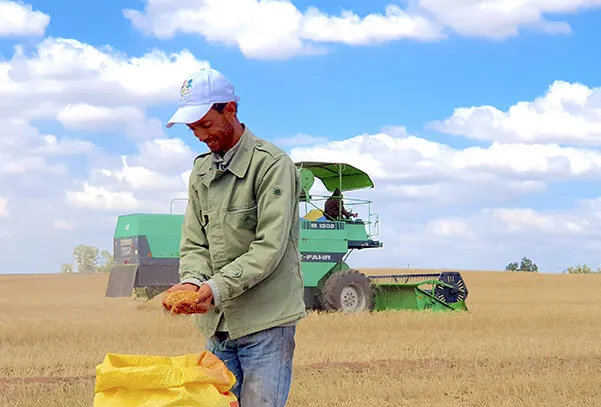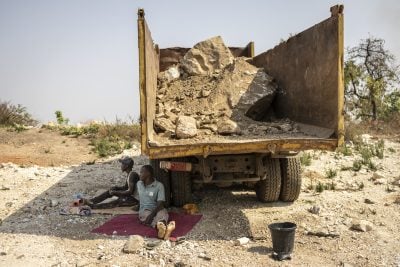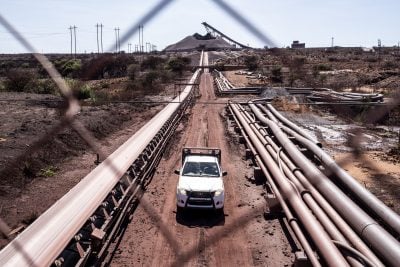This article was produced with the support of OCP
People today talk of sustainable productivity in the industry. What are you doing to achieve sustainability across phosphate and fertiliser production?
Over a year ago now, OCP launched two main programmes: Circular Economy and Act4Community. They rely on strong and holistic approaches that have the ambition to make OCP Group a global leader in sustainability.
OCP’s circular economy programme is structured around four pillars: resource preservation, sustainable production, responsible consumption and waste recycling and valorisation. We have ambitious targets such as sourcing 100% clean electric energy, 100%-treated used water & desalinated seawater consumption, and working so that we have the best-in-class environmental solutions and rather than creating waste, re-generating this for maximum optimization of all resources.
In terms of agriculture solutions we work on an efficient use of nutrients to ensure what we call balanced fertilisation for a more sustainable agriculture. We were the first company to create a soil map for the African continent which means that we can supply fertilisers adapted to the soil, not only ensuring greater productivity from the farmer’s perspective but also ensuring that we are using the right nutrients that is adapted to that soil and thus doing so in a sustainable manner.
We know, especially when it comes to natural resources and agriculture, that we operate within a wider community and we have developed a clear statement of purpose. So promoting social inclusion is at the centre of our strategic approach and this is driven by our Act4Community programme that defines our social purpose in what we do. This initiative is central to our business model and any strategic business decision we make.
Coming back to agriculture and your shift a decade or so ago to focus on becoming a global player in fertilisers. What role do you see fertiliser products increase agricultural sustainability across Africa?
In a short period of time we have become a world leader in the fertilisers industry and through our mission we made the commitment of “Feeding the soil to feed the planet”. And one of our strongest engagements is in supporting the African green revolution. The African continent has significant agricultural potential, but it is largely untapped. Over half of the world’s fertile yet unused cropland is in Africa, served by abundant water resources, and more than 60% of Africa’s labour force is employed in agriculture; however, African yields remain very low, reaching 3 to 6 times less than global averages. While fertiliser use is crucial for agricultural productivity, the African farmer experiences many constraints for the effective use of fertilisers: affordability; access; adapted products; availability and knowledge.
To address these barriers, OCP changed its whole business model and created a dedicated subsidiary named OCP Africa. We felt that the continent needed a different approach and one that engaged all stakeholders, from institutions and governments to the end user, that is the African farmer.
OCP Africa is present in 16 countries and promotes a comprehensive solution centred on the smallholder farmer. Many initiatives have been implemented to secure a sustainable increase in yield, through R&D, soil mapping as I mentioned, balanced fertilisation, capacity building at a farmer level and also local production of fertilisers. With the R&D and soil mapping, we have been able to define exactly the need of the farmers and develop customised formulas that respond exactly to the crops and soil needs and promote responsible agriculture; in some cases the yield has been improved by nearly 40%, and by looking at the whole supply chain have managed to reduce the cost of fertilisers for the farmer.
We also worked closely with the farmers to empower them through soil analysis and training. In 2018, the OCP school lab training & soil testing at farmers’ reached 150,000 smallholder farmers. We have what we call a caravan that went to 1,500 villages in 7 African countries. These are mobile laboratories where we train farmers and help them structure themselves to not only better use fertilisers but also deal with other constraints holistically, such as access to finance, using technology to get live market prices and other solutions.
OCP also launched a Fund for Agribusinesses, which is an African Agriculture Investment Initiative, to catalyse capital into markets that depend upon or enable agricultural value chains, to facilitate investment into inclusive businesses that directly benefit smallholders, and to fill the investment gap for SMEs in agribusiness.
You mentioned rationalising the supply chain and also clean energy solutions. What is OCP doing to reduce its carbon footprint and how are you transitioning to a cleaner energy future?
OCP has always placed environmental excellence at the heart of its industrial development strategy. Many actions have transpired from this. Today we have implemented a circular economy programme. As an industry we are water and energy intensive and as a result our two biggest programmes are focused on water and energy. For energy, our target is to be 100% self-sufficient using clean electrical energy in the medium term. In terms of water usage, we aim to reach a neutral conventional water footprint, and use exclusively desalinated seawater and urban wastewater treated and recycled in our plants.
Are new technologies helping the firm to become sustainable?
Developing new technologies is critical to support our sustainability strategy. Our aims are founded on bringing or developing the best available technologies, and we have substantial resources developed on R&D. We have seen significant developments across our sites. The Sulfacid process for gas washing is actually a great example. We incubated internally an existing technology but it was still not adapted to large-scale Sulfuric acid production gas washing. It took more than 2 years to develop, to adapt and redesign the technology. Today we have developed the cleanest units in the world, achieving 98% less emissions and 10 times below the regulated norm.
Innovation is central to what we do. The Group invests continuously in R&D. Much of our R&D takes place at the Mohammed VI Polytechnic University. It’s a state of the art facility and we are making it a leading research hub and an incubator for ideas and innovation. The Innovation Strategy is structured around four axes: farmer solutions; ‘hacking phosphate’, that is developing new products and by-product given Morocco sits on the world’s largest reserve of this important mineral; efficiency; and sustainability.
 Sign in with Google
Sign in with Google 



